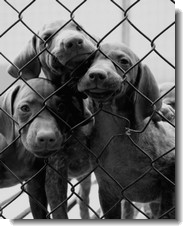
International Laws Governing Puppy Mills
Worldwide, government regulation and control of the puppy industry has become increasingly necessary with the introduction of puppy mills and their treatment and often mistreatment of dogs. In developed and developing countries around the world – countries in which their peoples are apt to purchase pets – federal, provincial and state, and municipal laws have been created not only to regulate this industry, but also to investigate and combat animal abuse in general.
Australian Puppy Mill Laws:
Australia has responded to the problem of puppy mills by proposing the Animals Regulation of Sale Bill, which would prohibit the sale of dogs through pet shops, newspaper ads, and the internet. The objectives of this Bill are to crack down on impulse purchases and shut down unregistered backyard breeders, eliminating the easy profit from the sale of these dogs and, hopefully, the number of unwanted and abandoned animals.
UK Puppy Mill Laws:
The UK has gone further by passing the “Breeding and Sale of Dogs Act” in 1979. This legislation requires yearly inspections by a qualified vet for anyone breeding five or more litters each year. Females are restricted to one litter per year and six per lifetime. Breeders who choose to be members of the UK Kennel Club are required to register purebred puppies for sale with that organization and must certify the conditions under which the puppies were raised.
Next: Organizations Against Puppy Mills
Australia has responded to the problem of puppy mills by proposing the Animals Regulation of Sale Bill, which would prohibit the sale of dogs through pet shops, newspaper ads, and the internet. The objectives of this Bill are to crack down on impulse purchases and shut down unregistered backyard breeders, eliminating the easy profit from the sale of these dogs and, hopefully, the number of unwanted and abandoned animals.
UK Puppy Mill Laws:
The UK has gone further by passing the “Breeding and Sale of Dogs Act” in 1979. This legislation requires yearly inspections by a qualified vet for anyone breeding five or more litters each year. Females are restricted to one litter per year and six per lifetime. Breeders who choose to be members of the UK Kennel Club are required to register purebred puppies for sale with that organization and must certify the conditions under which the puppies were raised.
Next: Organizations Against Puppy Mills
Pet Meds: Dogs | Pet Meds: Cats | Dog Health : By Breed | Cat Health : By Breed | Dog Grooming | Cat Grooming | Pet Top 10's | Pet Food Recipes

United States Puppy Mill Laws:
In the US, dog and cat breeding is monitored through the US Department of Agriculture and the animal welfare laws. Their breeding is considered to be the same as he breeding, raising and selling of cows, pigs, and sheep, etc. Most State agencies also regulate animal breeding through their agriculture department, while most cities and counties do it under animal control.
The Animal Welfare Act (AWA) became law in 1966. It is the only federal law in the United States that ensures humane treatment of animals in research, on exhibition, during transport, and by dealers.
The USDA licenses more than 4500 animal dealers, most of them dealing in the wholesale breeding and distribution of dogs and cats. Although these dealers are supposedly much better now because of all the negative publicity (and millions of letters from pet lovers), the USDA has been very severely criticized in recent years for not being aggressive enough in pursuing the animal abuse and neglect in puppy mills.
In the US, dog and cat breeding is monitored through the US Department of Agriculture and the animal welfare laws. Their breeding is considered to be the same as he breeding, raising and selling of cows, pigs, and sheep, etc. Most State agencies also regulate animal breeding through their agriculture department, while most cities and counties do it under animal control.
The Animal Welfare Act (AWA) became law in 1966. It is the only federal law in the United States that ensures humane treatment of animals in research, on exhibition, during transport, and by dealers.
The USDA licenses more than 4500 animal dealers, most of them dealing in the wholesale breeding and distribution of dogs and cats. Although these dealers are supposedly much better now because of all the negative publicity (and millions of letters from pet lovers), the USDA has been very severely criticized in recent years for not being aggressive enough in pursuing the animal abuse and neglect in puppy mills.
Canadian Puppy Mill Laws:
Over the past fifteen years, the puppy mill industry has actually increased in Canada. Before 1995, most puppies in Canadian pet stores were imported from the United States, but in 1995, new legislation requiring that puppies be micro-chipped, vaccinated and health checked by a veterinarian was implemented by Agriculture Canada to regulate the import of puppies from the United States. Because many puppy shipments did not meet these standards, the new law was successful in reducing the number of puppies being imported into Canada; unfortunately, however, this decrease in imported puppies from the US created a demand that was met by an increase in Canadian mills.
Currently, federal animal cruelty laws offer little punishment for puppy mill owners, and many of these breeders simply pay their fine and carry on despite the consequences. However, in 2005, for example, The Province of Ontario made amendments to the Ontario Society for the Prevention of Cruelty to Animals Act to specifically address puppy mills. Ontario is the first province to enact such legislation, which includes maximum fines of $50,000 for puppy mill operators convicted of animal cruelty.
Over the past fifteen years, the puppy mill industry has actually increased in Canada. Before 1995, most puppies in Canadian pet stores were imported from the United States, but in 1995, new legislation requiring that puppies be micro-chipped, vaccinated and health checked by a veterinarian was implemented by Agriculture Canada to regulate the import of puppies from the United States. Because many puppy shipments did not meet these standards, the new law was successful in reducing the number of puppies being imported into Canada; unfortunately, however, this decrease in imported puppies from the US created a demand that was met by an increase in Canadian mills.
Currently, federal animal cruelty laws offer little punishment for puppy mill owners, and many of these breeders simply pay their fine and carry on despite the consequences. However, in 2005, for example, The Province of Ontario made amendments to the Ontario Society for the Prevention of Cruelty to Animals Act to specifically address puppy mills. Ontario is the first province to enact such legislation, which includes maximum fines of $50,000 for puppy mill operators convicted of animal cruelty.
Puppy Mills: Introduction
Definition, History, Locations
Conditions In Puppy Mills
Health Effects On Dogs Raised In Puppy Mills
Puppy Mill Laws: USA, Canada, Australia, UK
Organizations Against
What You Can Do To Stop Puppy Mills
Definition, History, Locations
Conditions In Puppy Mills
Health Effects On Dogs Raised In Puppy Mills
Puppy Mill Laws: USA, Canada, Australia, UK
Organizations Against
What You Can Do To Stop Puppy Mills
In addition, the AWA does not cover commercial breeders who sell directly to the public, and many animal welfare advocates believe that additional regulations are needed to assure buyers that breeding dogs and puppies are treated properly in these kennels. Some states have passed kennel licensing and inspection laws, but several attempts to amend the federal AWA have failed because the laws placed a huge burden on responsible breeders.
On the state level, in 2008, Pennsylvania legislators passed H.B. 2525, which provided basic protections for dogs in puppy mills. The bill requires the doubling of previous minimum cages sizes, and banning both the use of wire flooring in cages for dogs more than 12 weeks old, as well as the stacking of cages. It also required that dogs have free access to an outdoor exercise area twice the size of their primary enclosure, and that they receive veterinary examinations at least twice a year.
On August 1, 2009, a new Bill was passed in Pennsylvania (HB 39) that will eliminate the cruel and inhumane surgical practices at puppy mills in that state. Some Pennsylvania puppy mill owners perform debarking procedures (i.e. cutting or scarring of a dog's vocal cords), tail docking and other surgeries on their own, often without the use of anesthesia. The new law will require that these procedures be performed under anesthesia by a licensed vet.
On the state level, in 2008, Pennsylvania legislators passed H.B. 2525, which provided basic protections for dogs in puppy mills. The bill requires the doubling of previous minimum cages sizes, and banning both the use of wire flooring in cages for dogs more than 12 weeks old, as well as the stacking of cages. It also required that dogs have free access to an outdoor exercise area twice the size of their primary enclosure, and that they receive veterinary examinations at least twice a year.
On August 1, 2009, a new Bill was passed in Pennsylvania (HB 39) that will eliminate the cruel and inhumane surgical practices at puppy mills in that state. Some Pennsylvania puppy mill owners perform debarking procedures (i.e. cutting or scarring of a dog's vocal cords), tail docking and other surgeries on their own, often without the use of anesthesia. The new law will require that these procedures be performed under anesthesia by a licensed vet.
What DON'T We Have In Our Online Store?
Not much! Browse products made for dogs and cats in our online pet store!
Not much! Browse products made for dogs and cats in our online pet store!
Pet Top Lists!
You'll find everything from the smartest dogs to the friendliest cats in our pet top list pages!
You'll find everything from the smartest dogs to the friendliest cats in our pet top list pages!
Pet Meds: Dogs Pet Meds: Cats Common Dog Health Issues Common Cat Health Issues Dog Grooming Cat Grooming Pet Top 10's
Pet Health:Home
Copyright 2006-2011 PetMedsOnline.Org

